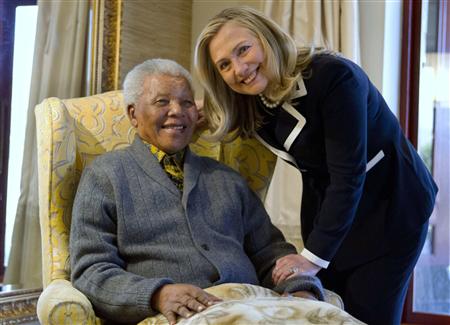
CAPE TOWN (Reuters) – South Africa’s next generation of leaders should honour the legacy of anti-apartheid hero Nelson Mandela by fighting for democratic values and human rights around the world, U.S. Secretary of State Hillary Clinton said on Wednesday.
She also called on South Africa, which voluntarily gave up its nuclear arms programme from 1989, to use long-standing links with Iran to persuade the Islamic Republic to reconsider what Western powers see as a covert pursuit of nuclear weapons.
Clinton, speaking two days after visiting the 94-year-old Mandela, said South Africa’s legacy of peacefully overturning white-minority rule brought with it responsibilities – and argued that Washington and Pretoria were natural partners despite their sometimes lukewarm relations.
“Few countries on this continent can carry as much weight or be such effective partners and leaders as South Africa,” Clinton told university students in Cape Town, in a speech billed as the centrepiece of an 11-day Africa tour. “You are a democratic power with the opportunity to influence Africa and the world.”
- Chamisa under fire over US$120K donation
- Mavhunga puts DeMbare into Chibuku quarterfinals
- Pension funds bet on Cabora Bassa oilfields
- Councils defy govt fire tender directive
Keep Reading
Her address was a strong call for South Africa to do more on everything from promoting economic development to solving global challenges, such as Syria’s bloody crisis or the standoff over Iran’s nuclear ambitions.
It also reflected Washington’s drive to draw emerging regional powers such as Brazil and India into a broader alliance of open societies and free markets as powerful rivals such as China increase their influence, particularly in Africa.
MORAL AUTHORITY
South Africa’s ruling African National Congress has had close ties with the Islamic leaders of Iran as well as with Western powers trying to put pressure on Tehran to end what they suspect is a drive to develop nuclear weapons capability. Iran says its uranium enrichment work is for peaceful purposes only.
“As the first country to voluntarily give up nuclear weapons, South Africa speaks with rare authority,” Clinton said. “You can most convincingly make the case that giving up nuclear weapons is a sign of strength, not weakness.”
She acknowledged that South Africa and the United States have had differences, including over the U.S.-led effort at the U.N. Security Council to approve possible sanctions against Syrian President Bashar al-Assad.
But she noted that South Africa, which abstained from the last Security Council vote on the issue, joined other countries in the U.N. General Assembly to approve a measure condemning the Assad government for its escalating crackdown.
“I hope this vote can be the foundation for a new level of cooperation on one of the more urgent questions of our time.”
Clinton tried to underscore that South Africa’s own values called it to greater action, particularly as a champion for democracy on the African continent.
“When old friends in power become corrupt and repressive, a decision by South Africa to stand on the side of freedom is not a sign that you are giving up on old allies, it is a reminder to yourselves and the world that your values to not stop at your borders,” she said.
South Africa has become more active in seeking to promote democratic change in neighbouring Zimbabwe, and Clinton said the United States was watching to see if President Robert Mugabe’s government follows through on promises to adopt a new constitution and hold free and fair elections.











